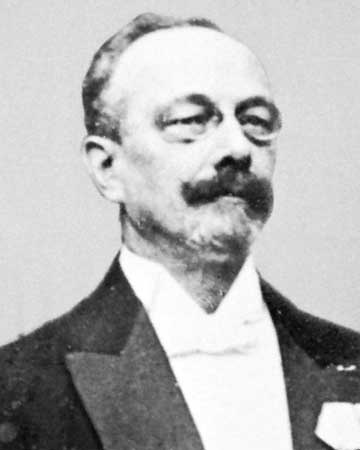Fibiger, Johannes
Danish pathologist
in full Johannes Andreas Grib Fibiger
born April 23, 1867, Silkeborg, Den.
died Jan. 30, 1928, Copenhagen
 Danish pathologist who received the Nobel Prize for Physiology or Medicine in 1926 for achieving the first controlled induction of cancer in laboratory animals, a development of profound importance to cancer research.
Danish pathologist who received the Nobel Prize for Physiology or Medicine in 1926 for achieving the first controlled induction of cancer in laboratory animals, a development of profound importance to cancer research.A student of the bacteriologists Robert Koch and Emil von Behring in Berlin, Fibiger became professor of pathological anatomy at the University of Copenhagen (1900). In 1907, while dissecting rats infected with tuberculosis, he found tumours in the stomachs of three animals. After intensive research, he concluded that the tumours, apparently malignant, followed an inflammation of stomach tissue caused by the larvae of a worm now known as Gongylonema neoplasticum. The worms had infected cockroaches eaten by the rats.
By 1913 he was able to induce gastric tumours consistently in mice and rats by feeding them cockroaches infected with the worm. By showing that the tumours underwent metastasis, he added important support to the then-prevailing concept that cancer is caused by tissue irritation. Fibiger's work immediately led the Japanese pathologist Yamagiwa Katsusaburo to produce cancer in laboratory animals by painting their skins with coal-tar derivatives, a procedure soon adopted by Fibiger himself. While later research revealed that the Gongylonema larvae were not directly responsible for the inflammation, Fibiger's findings were a necessary prelude to the production of chemical carcinogens (cancer-causing agents), a vital step in the development of modern cancer research.
- Ludwig Fischer
- Ludwig Forrer
- Ludwig, Freiherr Von Campersfelden Pastor
- Ludwig, Graf von Cobenzl
- Ludwig Gumplowicz
- Ludwig Haetzer
- Ludwig Heinrich Christoph Hölty
- Ludwig Heinrich Friedländer
- Ludwig Hilberseimer
- Ludwig, Jack
- Ludwig Klages
- Ludwig Knorr
- Ludwig Köchel, Ritter von
- Ludwig Leichhardt
- Ludwig Mies van der Rohe
- Ludwig Mond
- Ludwig Mylius-Erichsen
- Ludwig, Otto
- Ludwig Pastor, Freiherr Von Campersfelden
- Ludwig Pfyffer
- Ludwig Prandtl
- Ludwig Quidde
- Ludwig Renn
- Ludwig, Ritter von Köchel
- Ludwigsburg